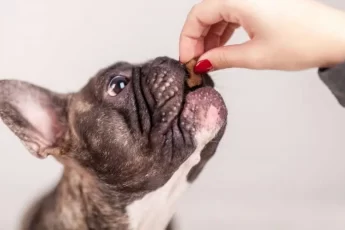French Bulldogs, also known as Frenchies, are a popular breed of dog that are known for their adorable and affectionate nature. Many people love to keep them as pets due to their unique appearance and playful personalities. However, French Bulldogs are also known to have sensitive stomachs and allergies. In this article, we will explore whether French Bulldogs are allergic to chicken and provide some helpful tips for managing food allergies in dogs.
- The Basics of French Bulldogs
- Why do French Bulldogs develop allergies to chicken?
- Is every French Bulldog allergic to chicken?
- How will I know if my French Bulldog is allergic to chicken?
- How do veterinarians treat chicken allergies?
- What are some ingredients to avoid when planning a diet for a French bulldog?
- How vets treat chicken allergies
- Can French Bulldogs eat chicken?
- Can French Bulldogs eat chicken leg bones?
- Are French Bulldogs Allergic to Chicken?
- A. French Bulldog’s Diet
- B. How to Determine if Your French Bulldog is Allergic to Chicken
- How Skin Allergies Manifest in French Bulldogs
- Symptoms of Skin Allergies in French Bulldogs
- Typical Skin Allergy Locations – Are French Bulldogs Allergic to Chicken?
- The Key to Managing French Bulldog Skin Allergies
- Dietary Needs and Adjustments Based on Health Changes
- FAQs
- Conclusion
The Basics of French Bulldogs
Before we dive into the topic of food allergies in dogs, let’s first discuss some basic information about French Bulldogs.
French Bulldogs are a small breed of dog that typically weigh between 16 and 28 pounds. They have short, smooth coats that come in a variety of colors, including brindle, fawn, and white. Frenchies are also known for their distinctive “bat ears” and wrinkly faces.
French Bulldogs are a friendly and affectionate breed that loves to be around people. They are also known to be stubborn and can be difficult to train at times. Frenchies are great companion dogs and make excellent family pets.
Allergies in Dogs
Just like humans, dogs can also develop allergies. Allergies in dogs are usually caused by an overreaction of the immune system to a particular substance, such as pollen, dust, or certain foods. There are several types of allergies in dogs, including:
Types of Allergies
- Environmental Allergies – Environmental allergies in dogs are caused by substances in the environment, such as pollen, dust, or mold.
- Food Allergies – Food allergies in dogs are caused by a reaction to certain foods, such as chicken, beef, or wheat.
- Flea Allergies – Flea allergies in dogs are caused by an allergic reaction to flea saliva.
Why do French Bulldogs develop allergies to chicken?
French Bulldogs, like many other dog breeds, can develop allergies to chicken. Chicken is a common ingredient in many dog foods, which means that French Bulldogs may be exposed to it regularly. Here are some potential reasons why French Bulldogs may develop allergies to chicken:
Protein sensitivity: French Bulldogs may develop an allergy to chicken protein, which can cause a range of symptoms including itching, redness, and gastrointestinal upset.
Overexposure: If your French Bulldog is regularly exposed to chicken in their diet, it can increase the likelihood of developing an allergy. This is because their immune system may become overstimulated by the protein.
Additives and preservatives: Chicken-based dog foods may contain additives and preservatives that can cause allergic reactions in some dogs. These additives can include artificial colors, flavors, and preservatives.
Genetics: French Bulldogs, like all dog breeds, can be genetically predisposed to developing allergies. If your French Bulldog has a family history of allergies, they may be more likely to develop an allergy to chicken or other proteins.
If you suspect that your French Bulldog has an allergy to chicken, it’s important to consult with your veterinarian. They can perform allergy testing to determine the cause of your dog’s symptoms and recommend an appropriate treatment plan. Treatment may involve eliminating chicken from your dog’s diet and switching to a hypoallergenic or prescription diet that avoids the allergen. With proper care and attention, most dogs with food allergies can live happy and healthy lives.
Is every French Bulldog allergic to chicken?
No, not every French Bulldog is allergic to chicken. While chicken allergies can occur in French Bulldogs, it is not a universal issue that affects every dog of the breed. In fact, many French Bulldogs can consume chicken without any adverse effects.
It’s important to note that French Bulldogs, like all dogs, can develop allergies to a wide range of proteins, including beef, dairy, and fish. Food allergies can be difficult to diagnose and manage, and it’s important to work with your veterinarian to develop an appropriate treatment plan.
If you suspect that your French Bulldog has a food allergy, it’s important to consult with your veterinarian. They can perform allergy testing to determine the cause of your dog’s symptoms and recommend an appropriate treatment plan. Treatment may involve eliminating the allergen from your dog’s diet and switching to a hypoallergenic or prescription diet that avoids the allergen.
While some French Bulldogs may be allergic to chicken, it is not a universal issue that affects every dog of the breed. If you suspect that your French Bulldog has a food allergy, it’s important to consult with your veterinarian to determine the cause of their symptoms and develop an appropriate treatment plan.
How will I know if my French Bulldog is allergic to chicken?
If your French Bulldog is allergic to chicken, they may exhibit a range of symptoms that can vary in severity. Here are some signs to watch for that may indicate a chicken allergy:
Skin irritation: French Bulldogs with a chicken allergy may experience itching, redness, and irritation of the skin. They may scratch or bite at their skin to relieve the itching.
Gastrointestinal upset: A chicken allergy can cause gastrointestinal upset in some French Bulldogs. This may include vomiting, diarrhea, and flatulence.
Ear infections: French Bulldogs with a chicken allergy may be more prone to ear infections. This is because the allergy can cause inflammation and excess wax production in the ears.
Respiratory issues: In severe cases, a chicken allergy can cause respiratory issues such as coughing, sneezing, and difficulty breathing.
If you suspect that your French Bulldog has a chicken allergy, it’s important to consult with your veterinarian. They can perform allergy testing to determine the cause of your dog’s symptoms and recommend an appropriate treatment plan. Treatment may involve eliminating chicken from your dog’s diet and switching to a hypoallergenic or prescription diet that avoids the allergen.
If your French Bulldog exhibits signs of skin irritation, gastrointestinal upset, ear infections, or respiratory issues, it may indicate a chicken allergy. It’s important to consult with your veterinarian to determine the cause of your dog’s symptoms and develop an appropriate treatment plan.
How do veterinarians treat chicken allergies?
If your French Bulldog has a chicken allergy, your veterinarian may recommend a variety of treatment options depending on the severity of their symptoms. Here are some common treatments for chicken allergies in dogs:
Elimination diet: If your French Bulldog has a chicken allergy, the first step in treatment is to eliminate chicken from their diet. This may involve switching to a hypoallergenic or prescription diet that avoids the allergen.
Allergy testing: Your veterinarian may perform allergy testing to determine the cause of your dog’s symptoms. This can help to identify other allergens that may be causing issues and guide the development of an appropriate treatment plan.
Medications: Your veterinarian may prescribe medications such as antihistamines or corticosteroids to help manage your dog’s allergy symptoms. These medications can help to reduce inflammation, itching, and other allergic reactions.
Immunotherapy: In some cases, immunotherapy may be recommended for dogs with severe allergies. This involves exposing your dog to small amounts of the allergen over time, which can help to desensitize their immune system and reduce the severity of their reactions.
Avoidance: Once your dog’s allergen is identified, it’s important to avoid exposure as much as possible. This may involve minimizing time spent outside during peak allergy season, using air filters in your home, and avoiding contact with known irritants such as cleaning products or certain fabrics.
Treating a chicken allergy in French Bulldogs requires a comprehensive approach that may involve elimination diet, allergy testing, medications, immunotherapy, and avoidance. It’s important to work closely with your veterinarian to develop an appropriate treatment plan and ensure that your dog receives the care and support they need. With proper care and attention, most dogs with food allergies can live happy and healthy lives.
What are some ingredients to avoid when planning a diet for a French bulldog?
French Bulldogs, like all dogs, have specific dietary needs that must be met in order to maintain their health and well-being. Additionally, some French Bulldogs may have food allergies or sensitivities that require avoiding certain ingredients in their diet. Here are some ingredients to avoid when planning a diet for a French Bulldog:
- Chicken: While not all French Bulldogs are allergic to chicken, it is a common allergen for dogs. If your French Bulldog has a chicken allergy, it’s important to avoid chicken-based dog foods and treats.
- Corn: Corn is a common ingredient in many dog foods, but it can be difficult for some dogs to digest. It may also contribute to obesity and other health issues.
- Wheat: Wheat is another common ingredient in dog foods that can be difficult for some dogs to digest. It may also contribute to skin allergies in some dogs.
- Soy: Soy is a common allergen for dogs and can contribute to skin allergies, digestive upset, and other health issues.
- Artificial preservatives and colors: Many dog foods contain artificial preservatives and colors, which can cause allergic reactions in some dogs. Look for dog foods that use natural preservatives and avoid products that contain artificial colors.
- Fillers: Some dog foods contain fillers such as corn gluten meal or wheat bran, which provide little nutritional value and can contribute to digestive upset and obesity.
When planning a diet for a French Bulldog, it’s important to choose high-quality dog foods that meet their specific nutritional needs. Additionally, if your French Bulldog has food allergies or sensitivities, it’s important to avoid ingredients that may trigger an allergic reaction. By choosing the right foods and avoiding problematic ingredients, you can help your French Bulldog maintain their health and well-being.
How vets treat chicken allergies
If your French Bulldog has a chicken allergy, your veterinarian may recommend a variety of treatment options depending on the severity of their symptoms. Here are some common treatments for chicken allergies in dogs:
- Elimination diet: If your French Bulldog has a chicken allergy, the first step in treatment is to eliminate chicken from their diet. This may involve switching to a hypoallergenic or prescription diet that avoids the allergen.
- Allergy testing: Your veterinarian may perform allergy testing to determine the cause of your dog’s symptoms. This can help to identify other allergens that may be causing issues and guide the development of an appropriate treatment plan.
- Medications: Your veterinarian may prescribe medications such as antihistamines or corticosteroids to help manage your dog’s allergy symptoms. These medications can help to reduce inflammation, itching, and other allergic reactions.
- Immunotherapy: In some cases, immunotherapy may be recommended for dogs with severe allergies. This involves exposing your dog to small amounts of the allergen over time, which can help to desensitize their immune system and reduce the severity of their reactions.
- Avoidance: Once your dog’s allergen is identified, it’s important to avoid exposure as much as possible. This may involve minimizing time spent outside during peak allergy season, using air filters in your home, and avoiding contact with known irritants such as cleaning products or certain fabrics.
Treating a chicken allergy in French Bulldogs requires a comprehensive approach that may involve elimination diet, allergy testing, medications, immunotherapy, and avoidance. It’s important to work closely with your veterinarian to develop an appropriate treatment plan and ensure that your dog receives the care and support they need. With proper care and attention, most dogs with food allergies can live happy and healthy lives.
Can French Bulldogs eat chicken?
Yes, many French Bulldogs can eat chicken without any adverse effects. However, some French Bulldogs may develop an allergy to chicken or other proteins, which can cause a range of symptoms including itching, redness, and gastrointestinal upset. If your French Bulldog exhibits signs of a chicken allergy, it’s important to consult with your veterinarian to determine the cause of their symptoms and develop an appropriate treatment plan.
If your French Bulldog does not have a chicken allergy, chicken can be a healthy addition to their diet. Chicken is a good source of protein, which is essential for building and repairing muscle tissue. When feeding your French Bulldog chicken, it’s important to choose high-quality, lean cuts of meat and to avoid feeding them bones or skin, which can cause digestive issues or choking hazards.
In addition to chicken, French Bulldogs require a balanced diet that provides them with all the essential nutrients they need to maintain their health and well-being. It’s important to choose high-quality dog foods that meet their specific nutritional needs and to avoid ingredients that may trigger an allergic reaction. By providing your French Bulldog with a healthy, balanced diet, you can help them thrive and live a happy, healthy life.
Can French Bulldogs eat chicken leg bones?
No, French Bulldogs should not be fed chicken leg bones or any other type of bones. While bones may seem like a natural and healthy treat for dogs, they can actually pose a serious risk to their health.
Chicken leg bones, in particular, can splinter easily and may get lodged in your dog’s throat, stomach, or intestines. This can cause choking, digestive issues, or even a life-threatening blockage. Additionally, bones can cause damage to your dog’s teeth and gums, leading to infections and other dental issues.
Instead of feeding your French Bulldog bones, provide them with safe and healthy treats such as fruits, vegetables, or high-quality dog treats that are specifically designed to meet their nutritional needs. If you have any concerns about your French Bulldog’s diet or nutritional needs, it’s important to consult with your veterinarian. They can provide guidance on feeding practices and help you develop a healthy, balanced diet plan for your dog.
Are French Bulldogs Allergic to Chicken?
Now that we understand the basics of food allergies in dogs and chicken allergies specifically, let’s answer the question at hand – are French Bulldogs allergic to chicken?
A. French Bulldog’s Diet
French Bulldogs have sensitive stomachs and can be prone to food allergies. Therefore, it’s important to choose a high-quality dog food that is specifically formulated for French Bulldogs. These foods are designed to meet the unique nutritional needs of the breed and can help to prevent digestive issues and allergies.
B. How to Determine if Your French Bulldog is Allergic to Chicken
If you suspect that your French Bulldog may be allergic to chicken, it’s important to consult with your veterinarian. They can perform allergy testing to determine the cause of your dog’s symptoms.
Symptoms of chicken allergies in dogs can include itching, inflammation, digestive issues, and respiratory problems. If your dog is experiencing any of these symptoms, it’s important to seek veterinary care right away.
How Skin Allergies Manifest in French Bulldogs
Skin allergies are a common issue for many French Bulldogs. These allergies can cause a variety of symptoms and can be caused by a number of different allergens.
Symptoms of Skin Allergies in French Bulldogs
The symptoms of skin allergies in French Bulldogs can vary depending on the type of allergy and the severity of the reaction. Some common symptoms include:
- Itching and scratching: This is the most common symptom of skin allergies in French Bulldogs. Dogs may scratch, bite, or lick their skin excessively, leading to hair loss and open sores.
- Redness and inflammation: Allergic reactions can cause redness, swelling, and inflammation of the skin. This can be especially noticeable in areas such as the ears, paws, and face.
- Hot spots: Hot spots are areas of the skin that become red, inflamed, and painful. They can be caused by bacterial infections that develop as a result of excessive licking and scratching.
- Dry and flaky skin: Some dogs with skin allergies may develop dry, flaky, and irritated skin. This can be especially noticeable in areas with less hair, such as the belly and armpits.
Ear infections: Allergies can cause inflammation and infection in the ears, leading to discomfort and a foul odor.
Typical Skin Allergy Locations – Are French Bulldogs Allergic to Chicken?
Skin allergies can occur in various locations on a French Bulldog’s body. The locations can be different depending on the allergen that is causing the allergic reaction.
Typical Skin Allergy Locations in French Bulldogs
Paws: Paw allergies are a common issue in French Bulldogs, especially during the summer months when allergens such as grass, pollen, and dust are more prevalent. Dogs may lick or chew their paws excessively, leading to redness and inflammation.
Ears: Allergies can cause inflammation and infection in the ears, leading to discomfort and a foul odor. French Bulldogs with floppy ears are especially prone to ear infections.
Face: Allergies can cause redness, swelling, and itching on the face, especially around the eyes and mouth. French Bulldogs may rub their faces against furniture or scratch with their paws to relieve the discomfort.
Belly and armpits: Skin allergies can cause dry, flaky, and irritated skin on the belly and armpits. Dogs may scratch or bite these areas excessively, leading to hair loss and open sores.
Tail: Allergies can also affect the tail area, causing redness, itching, and hair loss. French Bulldogs may lick or bite the base of their tail, leading to secondary infections.
The Key to Managing French Bulldog Skin Allergies
French Bulldogs are prone to skin allergies, which can cause discomfort, itching, and irritation. Managing these allergies can be challenging, but with the right approach, it is possible to keep your dog healthy and happy. Here are some key tips for managing French Bulldog skin allergies:
- Work with your veterinarian: If you suspect that your French Bulldog has a skin allergy, it’s important to consult with your veterinarian. They can perform allergy testing and recommend an appropriate treatment plan.
- Identify the allergen: Allergy testing can help to determine the specific allergen that is causing your French Bulldog’s symptoms. This can include environmental allergens, flea bites, contact allergies, and food allergies.
- Reduce exposure to allergens: Once the allergen is identified, you can take steps to reduce your French Bulldog’s exposure. This may include minimizing time spent outside during peak allergy season, using air filters in your home, and avoiding contact with known irritants such as cleaning products or certain fabrics.
- Use medicated shampoos: Bathing your French Bulldog with a medicated shampoo can help to soothe irritated skin and reduce itching. Your veterinarian may recommend a shampoo that contains oatmeal, aloe vera, or other ingredients that can help to hydrate and soothe the skin.
- Use topical treatments: Topical treatments, such as sprays, ointments, or creams, can be applied directly to the affected areas to reduce inflammation and itching.
- Manage secondary infections: Excessive scratching and biting can lead to secondary infections, such as bacterial or yeast infections. It’s important to work with your veterinarian to manage these infections and prevent them from recurring.
- Monitor your dog’s symptoms: It’s important to monitor your French Bulldog’s symptoms and adjust their treatment plan as needed. This may include adjusting their diet, changing their medication, or exploring other treatment options.
Managing French Bulldog skin allergies requires a comprehensive approach that includes working with your veterinarian, identifying the allergen, reducing exposure to allergens, using medicated shampoos and topical treatments, managing secondary infections, and monitoring your dog’s symptoms. With proper care and attention, most French Bulldogs with skin allergies can live happy and healthy lives.
Dietary Needs and Adjustments Based on Health Changes
French Bulldogs, like all dogs, have specific dietary needs that must be met in order to maintain their health and well-being. Additionally, as French Bulldogs age or experience changes in health status, their dietary needs may change as well. Here are some important considerations for dietary adjustments based on health changes in French Bulldogs:
Age-related changes: As French Bulldogs age, their metabolism and digestive system may change, which can affect their dietary needs. Older dogs may require lower-calorie diets or diets that are higher in fiber to support digestive health.
Weight management: French Bulldogs are prone to obesity, which can have a negative impact on their health. If your French Bulldog is overweight, your veterinarian may recommend a special diet or feeding plan to help them reach a healthy weight.
Food allergies: French Bulldogs can be prone to food allergies, which can cause skin allergies, gastrointestinal upset, and other health issues. If your French Bulldog has a food allergy, your veterinarian may recommend a hypoallergenic diet or a prescription diet that avoids the allergen.
Health conditions: If your French Bulldog has a health condition such as kidney disease, diabetes, or heart disease, their dietary needs may need to be adjusted to support their health. Your veterinarian can recommend a diet that is tailored to your dog’s specific health needs.
Dental health: French Bulldogs can be prone to dental issues such as periodontal disease, which can affect their ability to eat and digest food. If your French Bulldog has dental issues, your veterinarian may recommend a special diet that is softer and easier to chew.
In conclusion, French Bulldogs have specific dietary needs that must be met in order to maintain their health and well-being. As French Bulldogs age or experience changes in health status, their dietary needs may change as well. If you are unsure about your French Bulldog’s dietary needs or have concerns about their health, it’s important to consult with your veterinarian. They can recommend a diet that is tailored to your dog’s specific needs and help you make any necessary adjustments based on health changes.
FAQs
Can French Bulldogs eat chicken?
French Bulldogs can eat chicken, but some may be allergic to it. If you suspect that your French Bulldog may be allergic to chicken, consult with your veterinarian.
What are the symptoms of a chicken allergy in dogs?
Symptoms of a chicken allergy in dogs can include itching, inflammation, digestive issues, and respiratory problems.
What are the most common food allergens in dogs?
The most common food allergens in dogs include beef, dairy, eggs, wheat, and soy.
Can food allergies in dogs be cured?
While food allergies in dogs cannot be cured, they can be managed through diet and medication.
What should I do if I suspect that my French Bulldog has a food allergy?
If you suspect that your French Bulldog has a food allergy, it’s important to consult with your veterinarian. They can perform allergy testing and recommend the best treatment options for your dog.
Conclusion
In conclusion, French Bulldogs can be prone to food allergies, including chicken allergies. If you suspect that your French Bulldog may be allergic to chicken or any other food, it’s important to seek veterinary care right away. Your veterinarian can perform allergy testing and recommend the best treatment options for your dog.







